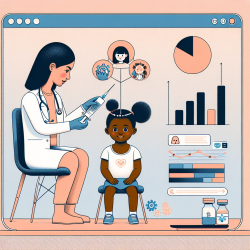Introduction
In the evolving landscape of healthcare, the concept of de-implementation—defined as the reduction or cessation of ineffective, harmful, or low-value health services—has gained significant attention. A recent study, "Studying de-implementation in health: an analysis of funded research grants," highlights the importance of de-implementation in improving patient outcomes and reducing healthcare costs. This blog explores how these findings can be applied to enhance online therapy services, particularly in pediatric settings, and encourages practitioners to delve deeper into this emerging field.
Understanding De-implementation
De-implementation involves systematically reducing or stopping the use of health services that do not provide value. This process is crucial for mitigating patient harm, improving care processes, and reducing unnecessary healthcare expenditures. The study by Norton et al. (2017) analyzed research grants funded by the NIH and AHRQ, identifying a need for more focused research in this area. Despite its importance, relatively few grants have been dedicated to de-implementation, highlighting an opportunity for further exploration and application in various health domains.
Applying De-implementation in Pediatric Therapy
For practitioners in speech-language pathology and online therapy services, de-implementation can be a valuable tool. By identifying and reducing the use of ineffective or outdated therapeutic practices, practitioners can enhance the quality of care provided to children. Here are some strategies to consider:
- Evidence-Based Practice: Regularly review the latest research to ensure that therapy methods are supported by robust evidence. This approach helps in phasing out practices that are no longer effective.
- Continuous Education: Engage in professional development opportunities to stay informed about new evidence and de-implementation strategies. This knowledge can be applied to refine therapy techniques.
- Collaborative Decision-Making: Work with parents and other healthcare providers to make informed decisions about therapy plans. This collaboration ensures that all stakeholders are aligned in providing the best care for the child.
Encouraging Further Research
The study underscores the need for more research on de-implementation, particularly in pediatric therapy settings. Practitioners are encouraged to contribute to this field by:
- Participating in Research: Engage in or initiate research projects that focus on de-implementation in child therapy. This involvement can provide valuable insights and drive innovation in therapeutic practices.
- Sharing Findings: Disseminate research findings through conferences, publications, and professional networks. Sharing knowledge helps build a collective understanding of effective de-implementation strategies.
- Advocating for Funding: Support initiatives that seek funding for de-implementation research. Increased funding can lead to more comprehensive studies and better outcomes for children receiving therapy.
Conclusion
De-implementation is a critical component of advancing healthcare quality and efficiency. By applying the principles of de-implementation in pediatric therapy, practitioners can ensure that children receive the most effective and evidence-based care. As the field continues to grow, there is a significant opportunity for speech-language pathologists and online therapy providers to lead the way in research and practice.
To read the original research paper, please follow this link: Studying de-implementation in health: an analysis of funded research grants.










